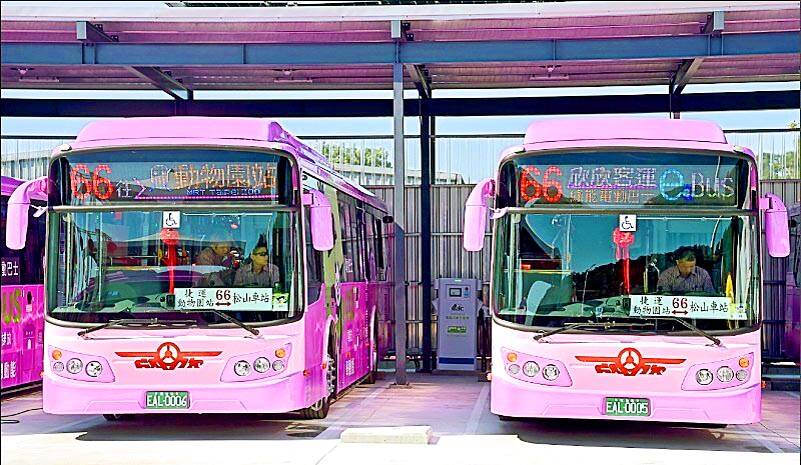The National Development Council on Monday approved a seven-year NT$64.3 billion (US$2.11 billion) plan to ensure that every bus and coach in Taiwan is electric by 2030.
The program aims to decarbonize public transport nationwide between next year and 2030 as part of government efforts to achieve net zero emissions by 2050, the council said.
Public bus and long-distance coach operators would receive subsidies of NT$3.34 million for each purchase of an electric vehicle to help them quickly phase out diesel vehicles, the council said.

Photo: Tsai Szu-pei, Taipei Times
The Ministry of Transportation and Communications proposed the rules.
The subsidy might reach as high as NT$3.7 million for each new electric vehicle to encourage public transportation operators to adopt an energy management system, the council said.
Once the electric buses and coaches hit the road, operators would receive an additional NT$1.6 million per vehicle for follow-up operations, it said, adding that the draft program is to be presented to the Cabinet for approval.
A national network of charging stations would be built with cooperation from local governments and Taiwan Power Co, ministry officials said.
As of February, there were 1,190 registered large electric passenger vehicles across Taiwan — 1,161 public buses and 29 coaches, which run on freeways.
Taiwan is expected to replace 12,170 diesel buses with electric buses by 2030.

EVA Air is prohibiting the use of portable chargers on board all flights starting from Saturday, while China Airlines is advising passengers not to use them, following the lead of South Korean airlines. Current regulations prohibit portable chargers and lithium batteries from check-in luggage and require them to be properly packed in carry-on baggage, EVA Air said. To improve onboard safety, portable chargers and spare lithium batteries would be prohibited from use on all fights starting on Saturday, it said. Passengers are advised to fully charge electronic devices before boarding and use the AC and USB charging outlets at their seat, it said. South

Hong Kong-based American singer-songwriter Khalil Fong (方大同) has passed away at the age of 41, Fong’s record label confirmed yesterday. “With unwavering optimism in the face of a relentless illness for five years, Khalil Fong gently and gracefully bid farewell to this world on the morning of February 21, 2025, stepping into the next realm of existence to carry forward his purpose and dreams,” Fu Music wrote on the company’s official Facebook page. “The music and graphic novels he gifted to the world remain an eternal testament to his luminous spirit, a timeless treasure for generations to come,” it said. Although Fong’s

WAR SIMULATION: The developers of the board game ‘2045’ consulted experts and analysts, and made maps based on real-life Chinese People’s Liberation Army exercises To stop invading Chinese forces seizing Taiwan, board gamer Ruth Zhong chooses the nuclear option: Dropping an atomic bomb on Taipei to secure the nation’s freedom and her victory. The Taiwanese board game 2045 is a zero-sum contest of military strategy and individual self-interest that puts players on the front lines of a simulated Chinese attack. Their battlefield game tactics would determine the theoretical future of Taiwan, which in the real world faces the constant threat of a Chinese invasion. “The most interesting part of this game is that you have to make continuous decisions based on the evolving situation,

China’s military buildup in the southern portion of the first island chain poses a serious threat to Taiwan’s liquefied natural gas (LNG) supply, a defense analyst warned. Writing in a bulletin on the National Defense and Security Research’s Web site on Thursday, Huang Tsung-ting (黃宗鼎) said that China might choke off Taiwan’s energy supply without it. Beginning last year, China entrenched its position in the southern region of the first island chain, often with Russia’s active support, he said. In May of the same year, a Chinese People’s Liberation Army Navy (PLAN) force consisting of a Type 054A destroyer, Type 055 destroyer,